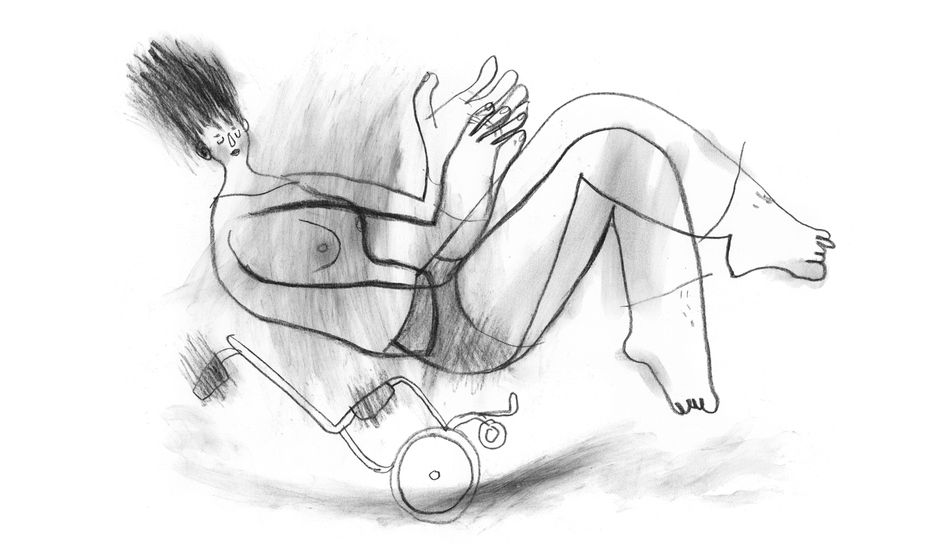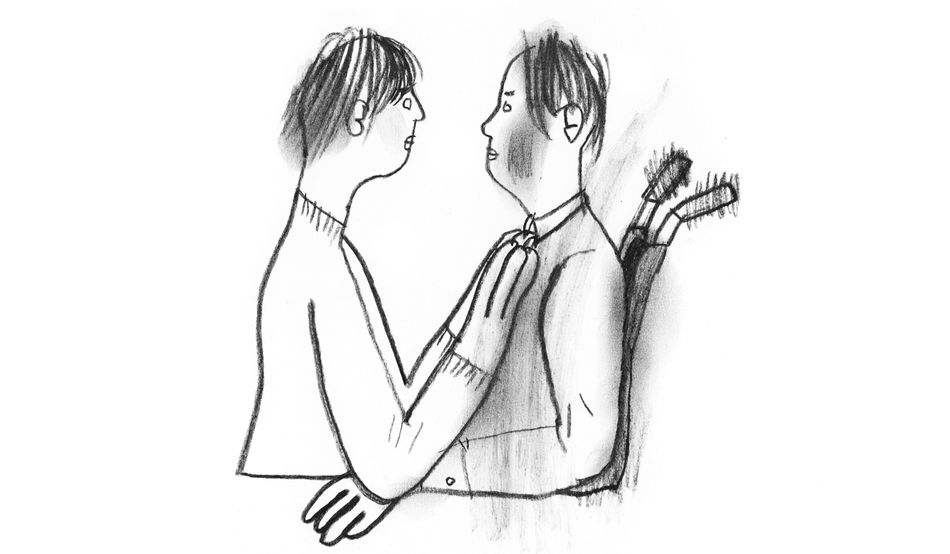In 2013, the French newspaper Libération published an unusual op-ed. “I am in a wheelchair,” wrote Patricia Assouline, then 41 years old, and a virgin. “I try my best, but I can’t. My sex drive is so high that I am writhed in pain.”
Assouline, a theatre actor, is unable to use her arms or legs. Consumed by her involuntary abstinence, she was struggling with a deep depression at the time. “I told myself it would never happen. It made me very unhappy,” she said over Zoom when we first met online, more than two years ago. Speaking from her Parisian flat, Assouline was funny and sometimes abrasive, swearing and laughing a lot. Her reddish hair was cut short, emphasising one cauliflower ear. Sometimes, her home care assistant criss-crossed the room, crouching in an unsuccessful attempt to avoid appearing on screen.
By the time she wrote her op-ed, Assouline had spent years collecting the phone numbers of escorts she found online, but she could never bring herself to call any of them. What if they mocked her disability? What if they hurt her?
One potential solution lay in “sexual surrogacy”, a practice first conceived in the United States in the 1960s as a form of therapy. Sex surrogates, or surrogate partners, as they prefer to be called, are paid to have intimate relations with people who have difficulty establishing a sex life, including those living with disabilities. Surrogacy is meant to encourage autonomy. According to the approach most accepted by therapists, surrogates only meet with clients for a limited number of sessions, much like a short course of counselling. They perform the role of substitute for a sexual partner, for a time, and always with the involvement of a therapist.
But in France, where Assouline lives, sexual surrogacy has morphed into sexual assistance, intimate support that is only geared towards people with disabilities and does not involve a third-party therapist. For some, including certified surrogates, sexual assistance is no different to sex work. It is sex as a service, rather than sex as therapy.
And in France, sexual surrogacy falls into a legal grey zone. Selling sex isn’t criminalised but buying sex or facilitating prostitution is illegal. Under the law, surrogates are treated like sex workers, and clients risk a fine of up to €3,750—or much more if the sex worker is under 18. A debate about legalising surrogacy has simmered for years. In 2013, the French National Ethics Committee (CCNE)—an advisory body that examines ethical dilemmas in biology, medicine and health—considered the implications, but ultimately advised against it.
Assouline first heard about the possibility of sex surrogacy when the CCNE communique came out. After her piece in Libération was published in response, Assouline was contacted via Facebook by a man with disabilities who had paid for sex with surrogates. He offered to put her in contact with people he knew. Determined to try it out for herself, Assouline exchanged messages with a woman who usually helped sexually frustrated men but was open to working with women, too.
She already had plans to travel to the south of France for the Festival d’Avignon, an annual arts event, and the woman who had offered to help Assouline didn’t live far from there. They met in a hotel and Assouline paid €150 for a 90-minute session, but the surrogate stayed all afternoon. With a background in medicine, she told Assouline that she had taken up surrogacy on the side after witnessing so much sexual misery in male patients.
That day, Assouline had sex for the first time. “I was euphoric ... Like I’d just met Santa or gone to Disneyland and tried all the rides,” she recalled. “Of course, it didn’t solve all my problems... But it was a great part of my distress.” The actor has been meeting regularly with surrogates ever since.
Sexual surrogacy has its roots in the experiments of American gynaecologist William Masters and sexologist Virginia Johnson. The pair conducted groundbreaking research from the late 1950s to the early 1990s, in which they observed individuals masturbating and couples having sex, in order to understand sexual dysfunction.
In his biography of Masters and Johnson, Masters of Sex, Thomas Maier describes one of the tests routinely conducted in their Washington University laboratory. “A young woman wandered into the examination room garbed in a white terry-cloth robe and a pillowcase over her head. Two ragged holes carved into the linen allowed her to see,” Maier writes. The woman then lay down on a chaise longue and was instructed to masturbate using a plexiglass dildo equipped with a camera, a device crafted by Masters and Johnson and nicknamed “Ulysses” by their staff. The participant’s brain waves and heartbeat were recorded and, as she climaxed, the researchers took notes.
“They were almost like cartographers,” Maier tells me. Their approach “could be boiled down to a very simple thought: let’s chart human sexual response so we can know how things work, and so that we can go ahead and fix [people’s problems].” They saw sex as a vital component of the treatment of sexual dysfunction, alongside talk therapy: a patient’s sexual partner would work with the patient and their counsellor. The trained professional would provide guidance on what should be explored physically, but would not attend sessions between the patient and their partner, where sexual problems were worked through.
But there was a limit to their initial approach. Masters pointed out that many people suffering from sexual dysfunction have difficulties finding a lover in the first place, and therefore couldn’t take part in the innovative therapy. Out of frustration, Johnson and Masters put their male patients in touch with women, sexual surrogates with whom they could have sex throughout their course of therapy.
In the 11 years of their initial study, which began in 1957, 13 female surrogates met with 41 unmarried men who had signed up to receive treatment for sexual dysfunction. Thirty-two of these patients were cured, reported Masters and Johnson. The men compensated their surrogate, but the payments were kept quiet to avoid legal repercussions. The women who agreed to participate came from a variety of backgrounds, including nursing and graduate study. They mimicked the part of a supportive partner, helping the men to resolve, through practice, not just their intimacy issues but other matters discussed in therapy, including the improvement of social skills. “Surrogacy was a tool,” says Maier. Masters and Johnson detailed this new type of therapy in their 1970 book, Human Sexual Inadequacy.
In treatment, surrogates play the part of a healthy and understanding boyfriend or girlfriend
Surrogate Partner Therapy (SPT), as it is now known, is still practised in the US following Masters and Johnson’s teachings. In treatment, surrogates play the part of a healthy and understanding boyfriend or girlfriend, from getting to know their client, to having sex with them and mutually consenting to breaking up at the end of the programme, in a heartbreak-free environment. “It’s basically a sandbox relationship,” Mark Shattuck tells me. Shattuck, a certified surrogate partner living in San Francisco, has worked with therapists and their clients—most commonly middle-aged virgins, and not necessarily living with disabilities—for the past 17 years.
If SPT lives on the fringes of mainstream American therapy, it does not even officially exist in most European countries, including France, where surrogates tend to help clients outside the boundaries of therapy. Sheila Warembourg worked as a physiotherapist in the US in the late 1980s. Back then, part of her onboarding for new patients with disabilities included questions about their intimacy and sexuality. In the 1990s, Warembourg moved to France with her French partner, whom she met when they were teenagers. She was shocked that disabled people’s sex lives were taboo, particularly in a nation where she had expected attitudes to be far less prudish than in the US.
Warembourg wanted to help people with disabilities maintain a sexual life, and her quest led her to the Middle East. “I’ve always been in contact with people with disabilities. When I hear about their deprivations, I can’t remain indifferent. I live my life. I do what I want with my partner, however I want. I can’t stand the idea that they are deprived of that,” she says. In 1997, she flew to Israel, where the psychotherapist and sexologist Ronit Aloni had founded a sexual therapy clinic eight years earlier. Aloni’s clinic in the central city of Ra’anana has offered surrogate services and training for surrogates since 1996. In that time, SPT has evolved into a relatively mainstream practice in Israel. Mr A, a paralysed former army reservist interviewed by the BBC in 2017, was among the first wounded soldiers whose SPT was funded by the country’s Ministry of Defence.
The clinic treats sex-related problems from erectile dysfunction to vaginismus, a condition which causes muscles to contract painfully during vaginal intercourse. Women are increasingly becoming clients for surrogacy; in 2011 they accounted for 40 per cent of referred cases. More controversially, it has been reported that rabbis sometimes refer homosexual ultra-Orthodox Jewish men to the clinic for instruction in heterosexual intercourse.
In Israel, Warembourg met two sexual surrogates, and she has been advocating for the practice ever since. Now a trained sexologist, she is also an instructor at Corps Solidaires, a Swiss association that has been training sexual surrogates since 2013, when the profession was legalised and regulated in Switzerland.
Being a surrogate within a course of therapy, or outside it, is not typically a full-time job. This means that surrogates tend to moonlight, and they come from all walks of life. What they have in common is a subtle understanding of the human body, its capacities and limits.
“I’m unlike a talk therapist who might only share 5 per cent of themselves with their clients. I’m sharing 80 per cent of myself,” Shattuck, the surrogate partner, says. “You can’t do this full time. you don’t have the emotional capacity to see 15 or 20 clients a week like a talk therapist would.” Shattuck charges $225 for a 90-minute session, the price of regular therapy in San Francisco.
There are websites that match surrogates with people seeking their services. Fiona manages TLC Trust, a branch of a British nonprofit that helps facilitate sexual services for people with disabilities (and which once organised “fabulous sex parties”, she recounts when we speak). Surrogates working independently of therapists advertise their services on the TLC Trust website following a light screening process. Over our video call, Fiona, with rainbow hair and tattooed knuckles, tells me about losing her job as a social worker 12 years ago after a breakdown. She subsequently became a sex worker and, about three years later, learned about sexual surrogacy. A prerequisite for the job, she says between puffs on her neon blue vape, is not to be put off by catheters, colostomy bags or percutaneous endoscopic gastrostomy tubes.
In Britain, sexual surrogacy— whether within a course of therapy or outside it—is considered the same as sex work, which is legal, though various activities related to prostitution are not, such as soliciting, forcing someone into sex work, owning or managing a brothel, pimping and advertising for services. “You’re paying for my time. And what we choose to do in that time is our business,” Fiona says when I ask about the legalities of the surrogacy services she provides. She charges £150 an hour.
In France, where the laws governing prostitution are more punitive, one small organisation is trying to keep the practice of sexual surrogacy alive. In 2015, the activist Marcel Nuss, who died in February last year, founded the Association for the Promotion of Sexual Surrogacy (APPAS), the first and only one of its kind in the country. Nuss set up the organisation due to the “enormous demand” for sex surrogacy, he told me when we met on Zoom in 2022. He was lying still on his mattress, unable to move, and spoke in a rasping tone. Living with a disability himself, he shared horror stories of abuse in group homes resulting from the inability of staff to deal with the libidos of residents. The time, for instance, when a staff member overheard cries echoing from a bathroom. A young man was sitting on the toilet, his arms tied, his legs impeded by his underwear, which had been pulled off. “[The staff member’s] colleagues were exasperated to see him masturbating compulsively in the common room,” Nuss recalled. “They didn’t have any better idea but to restrain him.”
In the early 2010s, sexual surrogacy divided disability activists. “We agreed on everything, but no one dared take action because everyone was afraid of breaking the law,” Nuss told me. After APPAS was founded in 2013, the association’s first-ever sexual surrogacy training was almost called off after the manager of the venue cancelled, terrified she would be arrested for facilitating sex work. With the creation of APPAS, Nuss wished to confront the French authorities and the public with what he thought was a major blind spot: people were paying surrogates to have sex. France could no longer pretend it wasn’t happening.
Every year, APPAS preps a new cohort of surrogates. In September 2022, that training took place in the sunny, aqua-green conference room of a Lyon hotel. One by one, the participants introduced themselves: a twenty-something dancer with a tattoo on her neck; a woman with big blue eyes, dressed all in black, her body shaking; a mother-of-three with hair so long it reached the base of her spine.
What sex surrogates have in common is a subtle understanding of the human body, its capacities and limits
Over the next four days, 14 women and one man, all strangers, would learn about making love to people with disabilities in order to help them achieve an autonomous sex life (and for money). There were three exercises intended to illustrate different kinds of physical intimacy. First, the participants paired up and looked into each other’s eyes for about 10 minutes. Then, they interlocked their legs and put a hand on their partner’s thigh for another 10 minutes. Finally, the participants massaged their partner, who was required to sit still on their chair. In most cases this exercise was platonic, but one tall woman with long mermaid hair was massaging her partner’s clitoris through her jeans.
There is nothing illegal in APPAS’s training; it is the sending of client requests to surrogates which is technically illegal in France. To date the association has not been sued, despite operating publicly. Applications are sent through its website. If selected for the service, clients are put into contact with the surrogate nearest to them. They cannot choose who to be paired with. The first meeting is an introduction, where expectations and consent are discussed, as well as questions around incontinence or other physical challenges. Should both sides feel ready to proceed, the accompagnement, or coaching, can begin.
For the surrogate, these sessions can be taxing. Lili*’s first sexual assistance experience was with a man in his forties who was completely paralysed. He was unable to speak, so she asked closed questions and tried to improvise. “If it happened today, I might be able to narrow down what he wanted based on past experiences, but the first time you do it, it’s not instinctive,” she says. “I felt inadequate.”
Lili connected with her ensuing clients though, and enjoys the work. One Sunday in July, she received a call from a former client telling her he was getting married. “It warmed my heart to hear that. I’m on the road, but their path continues.”
Sexual surrogacy is meant to remove blocks to intimacy and lead to sexual autonomy, but this is not always achievable. Sandhya* met her first client in February 2024 and has seen three more since. One of them, a man in his early thirties, contacted the association through his mother. Staff from the group home where he lived complained that he sometimes engaged in inappropriate behaviour. “He’ll never be able to have an autonomous sexual life,” says Sandhya. “I just can’t see myself telling him, ‘Hey, here you go, you’re on your own now.’”
But the temporary nature of sexual surrogacy is the nucleus of the concept. It’s because surrogacy is finite and has a therapeutic goal, its proponents argue, that it isn’t sex work. The idea that this red line is negotiable has raised eyebrows among American-certified surrogates, for whom this principle is immovable. To them, if surrogacy isn’t temporary, it morphs at the very least into some form of sexual assistance, if not straightforward prostitution. Shattuck compares the French APPAS to the White Hands programme in Japan, an NGO that trains social workers to help clients with disabilities ejaculate. “It’s a type of sex work and I think it’s a great thing,” he says, but “it’s not surrogate work.”
Surrogacy has more to do with social skills than sex, he insists. “Sex work is kind of like going to a nice restaurant. You have this great menu, you get to pick whatever you like, and then maybe if you really like it, you come back for more.” Surrogate work, on the other hand, “is more like cooking school where you come, we show you all the ingredients, we show you how to make a good meal, and then we send you off to cook.” Shattuck sees clients for anything from a few months to a few years, but it always ends. They eventually graduate from the programme, as he calls it.
Compared with the rigid American framework and the Swiss attempt at professionalising surrogacy, France’s APPAS seems almost amateur. As Sheila Warembourg, who is part of Corps Solidaires in Switzerland, points out, APPAS only trains its member for four days, while the trainees at Corps Solidaires meet for 12 days spread over a year. “Lengthy training is needed because the stakes are too high,” she says. But APPAS is led by volunteers and operates on a tight budget.
Among the dozen female surrogates Patricia Assouline has met, she tells me that there were two she would rather not have encountered. “They think that providing [sexual surrogacy] will make them heal, and everyone will be better for it. But that’s the worst thing they can do. The worst thing. It’s poison, for them and for us.” She worries that APPAS, and others, sometimes take “just anyone. It almost seems like they went down the street and found whoever.”
In the late 2010s, the French association had to fire one of its sexual assistants. The man had manipulated his disabled female clients to take advantage of them sexually. Nuss described it to me as “a form of rape insofar as there was this manipulation”. In 2020, Nuss left the association he had founded, having grown increasingly dubious of his creation. “APPAS became a sexual assistant training machine, which wasn’t the goal at first,” he said. “I could never have joined what APPAS has become.” Nuss’s dream was for the association to be at the forefront of the fight to legalise sexual surrogacy. But instead of activism, lack of funds means APPAS focuses on responding to the hundreds of requests for help it receives each year.
Feminist arguments against sex surrogacy say that this help is gendered and unequal. In 2022, APPAS’s former president, Jennifer Bondon, made it her priority to attract more female-identifying clients. Only four of the 220 requests from clients with disabilities received by the association between January 2022 and September 2022 came from women, despite women comprising 90 per cent of the association’s 35 active sexual surrogates. “The debate always revolves around these miserable men who must fulfill their needs,” says Claire Desaint, who campaigns for the sexual rights of disabled women. She compares surrogates to “comfort girls”, women forced into sexual slavery by the Japanese military before and during the Second World War.
Surrogates reject the idea that they are forced into surrogacy. They say they choose to do this, that it is fulfilling and a way of helping ease the pain of another human being. For others, the arguments might be more pragmatic. “There are several instances in my life when I only had sex to conform to a man’s expectation. It would have been rewarding to get paid for that,” says Stella, who attended APPAS’s 2022 training session.
Others argue that the very notion of sexual surrogacy implies that people with disabilities can’t have access to sex if they don’t pay for it. “Having a disability doesn’t make it easier or harder to find a partner, to be satisfied with your sexual life,” says Elsa Labouret, spokesperson for Osez le Féminisme, a French feminist association. She believes that “this generalisation is ableist.”
Charlotte Puiseux, a philosopher and psychologist whose memoir about having motor disabilities was published in 2022, believes legal surrogacy in France could create “good” and “bad” sex work, with people with disabilities as the ethical marker of that divide. “If a service is aimed at disabled people, it’s charity. So [sexual surrogacy] would fall into what’s morally right. But if the same service is not aimed at disabled people, it’s wrong, it’s sex work,” Puiseux says. Now she campaigns for legalising sex work itself.
Some argue that the very notion of surrogacy implies that people with disabilities can’t have sex without paying for it
Something everyone can agree on is that surrogacy wouldn’t be many people’s first choice, but places where people commonly meet, such as bars, clubs, theatres and cinemas, are rarely accessible to many people with disabilities. Nor are dating apps exactly welcoming. Disability is varied, and some people living with disabilities are more likely to meet a partner, or to have sex, than others. “Somebody needing hoisting in and out of bed and who has got very impaired speech, they’re not going to go down the pub and pick someone up for a one-night stand,” says TLC Trust manager Fiona.
Sexual surrogacy may be the equivalent of sticking a plaster on a gaping wound. Nuss himself thought of sexual surrogacy as a solution, not the solution. “Focusing on sexual assistance is missing the wood for the trees. Behind sexual assistance, there’s misery, sexual abuse,” he told me. Daily, people with disabilities are handled by others—sometimes with real care, but often with indifference, a cold clinical touch, or worse.
Having sex isn’t just about touch, of course, but also about the right to be desired. Detractors of surrogacy argue that money can’t buy the right to desire, or to feel desired, but proponents of surrogacy believe that paying for such services makes the sexual experiences no less valuable, or less real.
For Assouline, who has been paying surrogates for sex for the past decade and has no intention of stopping, that hardly seems the case or, at the very least, it hardly seems relevant. “My situation is still the same,” she told me that day over Zoom, “I’m still disabled from head to toe… It’s not that I don’t want to live an extraordinary love story. I’d give my life for that. My life!”♦
*names have been changed
Reporting for this piece was supported by the International Women’s Media Foundation's Kim Wall Memorial Fund












